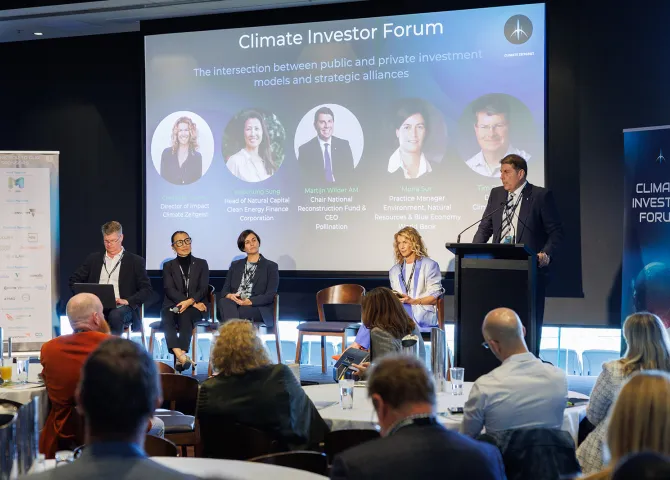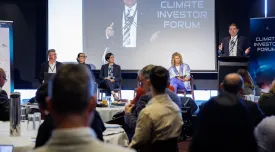Breadcrumb
- Home
- Industry Insights
- The Evolving Landscape of Climate Investment
The Evolving Landscape of Climate Investment
Insights from the Climate Investor Roundtable ahead of the Climate Investor Forum 19, March, 2025

In Melbourne, the financial sector has become the largest employer, surpassing traditional sectors like hospitality and manufacturing. This shift highlights a broader global trend where finance is increasingly driving critical conversations about sustainability and climate action. The recent Climate Investor Roundtable hosted by Climate Zeitgeist, Investor Group on Climate Change (IGCC) and City of Melbourne, shed light on how this sector is evolving to meet the urgent demands of climate change.
From Niche to Mainstream: The Rise of Climate Finance
Two decades ago, sustainability discussions rarely intersected with finance. Today, however, climate finance has become central to major global climate events, such as the Climate Investor Forum coming up on March 19 in Melbourne. The Climate Investor Forum is recognised as one of the first significant climate events of the year and serves as a catalyst for commercial interactions and innovative climate solutions. Melbourne, with its growing reputation for innovation, plays a leading role in this transformative landscape.
Key Insights from the Roundtable
- The Role of Government and Policy: Government action remains crucial in both city and national contexts. IGCC emphasised that while ambition within the investment community is high, the lack of opportunities that align with desired risk-return profiles is a significant barrier. According to IGCC, 48% of investors find this mismatch a critical challenge.
- Bridging the Gap in Climate Solutions: The roundtable revealed that the investment playbook for software startups doesn’t translate neatly to hard tech solutions. There is a pressing need for enabling environments that address barriers faced by the investment community. Discussions highlighted that scaling climate solutions requires not only capital but also innovative strategies to bridge gaps in funding.
- Diverse Approaches to Investment: The roundtable featured a range of perspectives from asset management to venture capital, private equity to institutional capital. There was a need to align investment strategies with net-zero goals but an understanding that at the end of the day, investments in climate needed to make financial sense, first and foremost. It was also discussed Australia’s investment opportunities needed to be globally competitive to attract capital. With the fourth largest pension pool in the world, Australian superannuation companies want to invest in the world’s best opportunities.
- Innovative Funding Models: Guests at the roundtable shared their innovative approaches to funding climate solutions for maximum impact, better financial returns that fall within an appropriate risk profile. Case studies were presented A blended approach is required to create catalytic climate capital came from examples of early-stage venture capital combined with structured debt finance, growth equity with infrastructure funds. The roundtable discussed the challenge of funding capex-intensive climate projects and the need for a mix of expertise and flexible capital.
- Addressing the Valley of Death: One recurring theme was the challenge of navigating the "valley of death," where promising climate technologies struggle to secure the necessary funding to scale. Bridging the gap between VC backing and infrastructure funding.
The Path Forward: System-Level Investments and Policy Advocacy
The need for more investment in climate solutions has been the focus of industry conversations, including at the 2023 United Nations Climate Change Conference (COP28). However, we’re facing a colossal conundrum. We need recalibration on a systems level. Creating new industries, such as Sustainable Aviation Fuel, requires a risk appetite that doesn’t currently meet the fiduciary mandates of investors.
We need systems level, creating new industries, such as Sustainable Aviation Fuel, requires a risk appetite that doesn’t meet the fiduciary mandates of investors.
How do we change the risk profile of climate investment opportunities? For those in the room, the opportunity is obvious. The World Economic Forum estimates that global investment in the climate solutions supply chain could add $5-11 trillion in additional investment value by 2030 with mature solutions, such as electricity networks, renewables and sustainable vehicles. With Australia leading the world in rooftop solar penetration and an abundance of wind, we could be leaders in this new economy.
The roundtable discussions highlighted the need for a system-level view of investing in climate solutions. Effective strategies must include:
- Amplifying Conversations: Networks and ecosystems need to elevate discussions around climate solutions and investment opportunities.
- Encouraging System-Level Views: There’s a call for more effective lobbying and policy mandates that create demand-side requirements for climate solutions.
- Addressing Constraints: Understanding and overcoming constraints in investment and policy can accelerate the transition to a sustainable economy.
We need visionary leadership and mass collaboration!
The Climate Investor Roundtable underscored the significant role that finance plays in driving climate action. While the investment community shows remarkable ambition and innovation, there are clear barriers that need addressing. By bridging the funding gap, fostering a supportive policy environment, and advancing system-level investments, the path to scaling climate solutions and achieving global climate goals becomes more attainable. The collective efforts of investors, policymakers, and industry leaders are crucial in navigating this complex and evolving landscape.
As we move forward, the insights from this roundtable serve as a roadmap for how finance can be a powerful driver in the fight against climate change.
With mandatory reporting on scope three emissions, and climate financial risks, investment in climate solutions is no longer a nice-to-have, it’s a must have. Australia has an abundance of environmental assets, which it has started leveraging, we have an abundance of renewable energy, critical minerals and natural capital, coupled with the fourth largest pension pool in the world, Australia has all the ingredients to capitalise on the new economy of climate innovation.
The City of Melbourne is working hard with its partners to convene a large gathering of climate investors, innovators and leaders at the Climate Investor Forum to accelerate the deployment of capital towards solutions, providing economic growth and jobs in a net-zero, abundant economy.
Photo credit: Climate Investor Forum 2024
Secure your spot at the Climate Investor Forum - Global Climate Solutions Industry | Climate Investor Forum





